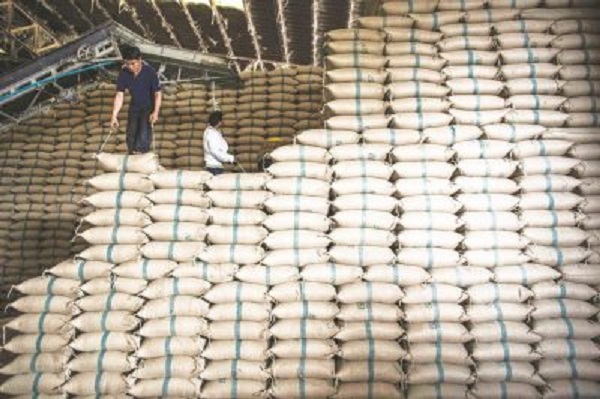As the Government of Sierra Leone today 11th May, 2015 officially launches the Rapid Ebola Rice Seedling distribution for the country’s farmers, World Bank Sierra Leone Country Manager, Francis Ato-Brown, has appealed to the Ministry of Agriculture, Forestry and Food Security (MAFFS) and all the stakeholders to put in place an appropriate plan with measures to ensure that the seed is properly utilized in order to achieve the anticipated benefits.
“We need to identify farmers who have the means to be able to utilize the seed, and not consume it; we need to put in place appropriate monitoring arrangements to ensure better use; we also need to set-up appropriate recovery mechanisms so that we can build-up seed stock which will benefit other farmers in the next growing season,” says Ato-Brown at the launching at the Seed Multiplication Compound, Makama Road, Makeni, Bombali District, Northern Sierra Leone.
Over 1,500 metric tons (mt) of certified rice seed for both upland and lowland cultivation is going to be distributed this season to over 23,000 farm households in all of Sierra Leone’s 14 Districts. Currently, 602 mt of certified lowland rice seed (Nerica L19) and 22.03 mt of certified upland rice seed (Nerica L4) have been delivered and are ready for distribution.
In addition, 75 mt of foundation seed (Nerica L20) has also been delivered and will be multiplied.The processes for the delivery of the other consignment are on-going and it is expected that the outstanding seed supplies will be in the country soon.
According to Ato-Brown, the emergency seed support is meant to achieve two main objectives: (i) to help farmers harvest more rice this year, which will help them to recover quickly from the negative impacts of Ebola on rural agro-based livelihood systems; and (ii) to help strengthen the country’s seed system through the additional stock of foundation seed which will be multiplied, certified and be available for the next growing season.
“Given that agriculture supports over 80% of the rural population, we believe this emergency seed support, if properly utilized, will go a long way towards reviving the agricultural sector and the rural livelihoods,” notes the World Bank Country Manager.
For the foundation seed, the World Bank also stresses the need to identify appropriate seed multipliers who should be entrusted with the responsibility for multiplication. If properly done, says At-Brown, this presents an opportunity to kick-start the establishment of a sustainable private-sector led seed supply system in the country.
The World Bank and the Government of Japan, through the West Africa Agricultural Productivity Program (WAAPP) are supporting the development of sustainable seed system for rice and cassava in Sierra Leone. As such, the Bank sees an opportunity that the proper multiplication of the foundation seed provided as part of the Ebola emergency package will complement the existing work on rice seed development and multiplication being undertaken by the Sierra Leone Agricultural Research Institute (SLARI) and the Crops and Extension Divisions under MAFFS.
“We hope the Seed Multiplication Program (SMP) and the Sierra Leone Seed Certification Agency (SLeSCA) will coordinate closely to ensure that this is successful,” says Ato-Brown.
The World Bank Country Manager appreciates the role of the MAFFS in coordinating the distribution of the emergency seed and following-up with monitoring and recovery activities, and commends ECOWAS, through CORAF/WECARD for coordinating with the suppliers of the seed from a number of countries in the region (Mali, Burkina Faso, Togo and Nigeria).
He extends further appreciation to AfricaRice for the role they played in providing the technical guidance to identify the right type of seed suitable to Sierra Leone.
“The coordination between CORAF/WECARD, Africa Rice, Mano River Union and the regional member states has been excellent and is highly acknowledged,” observes Ato-Brown.
The bulk of the resources provided to support the procurement, delivery and distribution of the Ebola emergency seed have come through the World Bank supported Ebola Emergency Response Project, through a Memorandum of Understanding signed between MAFFS and the National Ebola Emergency Center (NERC).
“We therefore extend our appreciation to the NERC for the excellent coordination in this regard, and appreciate the role played by the National Coordinators of WAAPP in all the member states who have been in the fore-front coordinating this activity at the country-level,” notes Ato-Brown.
The project, costing about US$3million, is financed and co-ordinated at the regional level (Sierra Leone, Liberia and Guinea) by the World Bank and ECOWAS (CORAF/WECARD).
It could be recalled that while launching the Social Protection Strategy for Sierra Leone in Magburaka, Tonkolili District, on 5th May 2015, President Ernest Bai Koroma said the social safety net unconditional cash transfers scheme coupled with the provision of seed should help the country’s farmers invest in agricultural activities and bail themselves out of extreme poverty.
The Ebola epidemic severely affected agriculture and farm foods and farming activities, the economic mainstay of the small West African country.
Meanwhile, Ato-Brown says the Bank looks forward to a successful implementation and hopes to see tangible results at the end of this growing season as well as the subsequent seasons.











